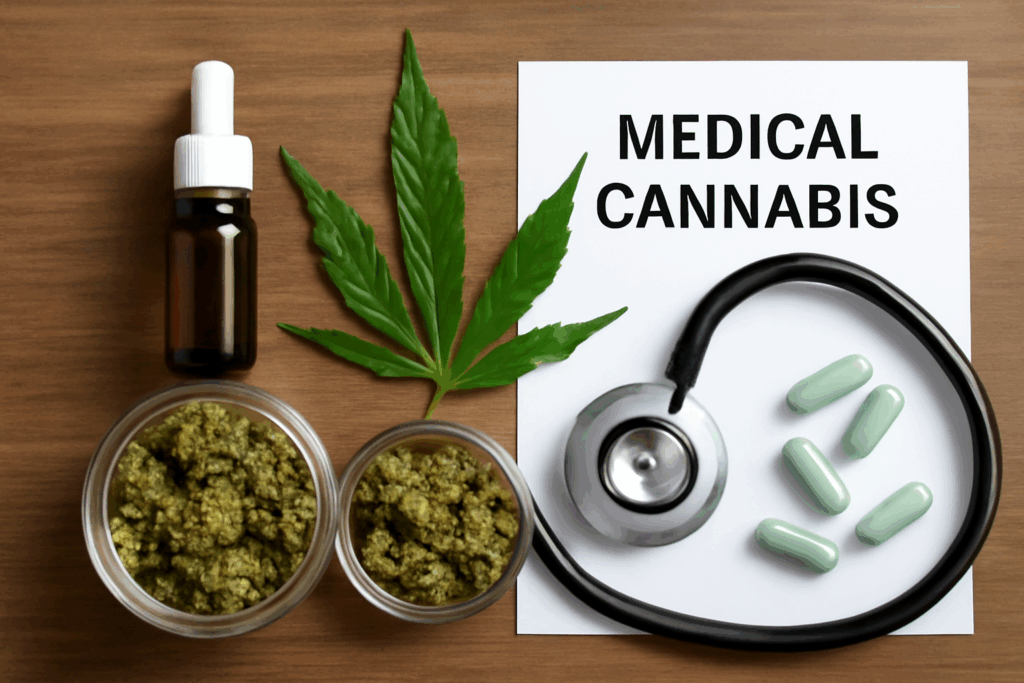Introduction
Medical cannabis oil, a concentrated extract from the cannabis plant, is gaining traction as a therapeutic tool for various health conditions. With growing research and global legalization efforts, more patients and healthcare providers are exploring its potential. Understanding its benefits, dosage guidelines, and possible side effects is essential for safe and effective use.
This guide delves into medical cannabis oil, its role in modern medicine, and what patients should know before considering it as part of their treatment plan.
What Is Medical Marijuana?
Medical marijuana refers to cannabis used for therapeutic purposes, often prescribed to alleviate symptoms of chronic illnesses. Unlike recreational cannabis, medical marijuana is regulated, standardized, and tailored for specific health outcomes.
Origins and Regulation
Cannabis has been used medicinally for centuries, but modern medical marijuana products, including oils, provide precise concentrations of cannabinoids such as THC and CBD. Prescriptions are regulated by healthcare providers, and legal access varies depending on the country or state.
How Cannabis Works in the Human Body
The endocannabinoid system (ECS) is the key to understanding how medical cannabis oil affects the body. The ECS consists of receptors, mainly CB1 and CB2, which interact with cannabinoids to regulate mood, pain perception, inflammation, and immune responses.
- THC binds to CB1 receptors in the brain, affecting pain, appetite, and stress response.
- CBD indirectly influences ECS activity, reducing inflammation and anxiety without psychoactive effects.
This interaction explains why medical cannabis oil can provide relief for a range of conditions.
See more: How Medical Cannabis Supports Mental Health and Wellness
Key Medical Uses and Benefits
Medical cannabis oil has shown promising results in treating multiple health conditions:
Chronic Pain
Cannabis oil can alleviate chronic pain by modulating pain signals in the nervous system. Patients with arthritis, fibromyalgia, or neuropathic pain often report significant relief.
Epilepsy
CBD-rich oils are approved in some countries for certain types of epilepsy. They reduce the frequency and intensity of seizures, improving quality of life.
PTSD and Anxiety
Medical cannabis oil can help calm hyperactive stress responses. Patients with PTSD or severe anxiety have reported better sleep and reduced panic symptoms under supervised use.
Cancer-Related Symptoms
Cannabis oil may reduce chemotherapy-induced nausea, stimulate appetite, and improve overall comfort for cancer patients.
The Role of Cannabinoids: CBD and THC
Cannabis oil contains two main cannabinoids: CBD and THC.
- CBD (Cannabidiol): Non-psychoactive, used for anxiety, inflammation, pain management, and neurological disorders.
- THC (Tetrahydrocannabinol): Psychoactive, providing pain relief, appetite stimulation, and relaxation, but may cause euphoria or mild anxiety if overused.
Modern cannabis oils are often formulated with balanced ratios of THC and CBD to maximize therapeutic effects while minimizing side effects.
Medical Marijuana in Modern Treatments (Real-World Examples)
United States
In the U.S., medical cannabis oils are prescribed for chronic pain, epilepsy, and mental health conditions in states where medical marijuana is legal. Clinics provide personalized dosing based on the patient’s condition and response.
Canada
Cannabis oil is federally regulated, with licensed producers offering standardized products. Patients work with healthcare providers to determine optimal dosing and cannabinoid ratios.
Australia
Through the Special Access Scheme, Australians can access prescribed medical cannabis oil for conditions such as chronic pain and anxiety. Ongoing research explores its broader applications in mental health and neurodegenerative diseases.
Legal and Ethical Considerations
Legal access to medical cannabis oil varies globally. Patients must consider:
- Prescription requirements and approved forms
- Possession limits and compliance with local regulations
- Ethical issues around accessibility and potential misuse
Healthcare providers guide patients to ensure safe, legal, and effective use while minimizing risks.
Potential Risks and Side Effects
Medical cannabis oil is generally safe under supervision but can cause side effects:
- Common: Drowsiness, dizziness, dry mouth
- Psychological: Mild euphoria, short-term memory changes, anxiety with high THC doses
- Long-term: Rare dependency, especially with prolonged THC use
Responsible dosing, starting low and titrating slowly, helps mitigate risks.
The Future of Cannabis in Medicine
The future of medical cannabis oil is promising:
- Research continues to explore specific cannabinoid formulations for different conditions.
- Public acceptance and legal frameworks are evolving to support therapeutic use.
- Emerging evidence may expand insurance coverage and integrate cannabis oil into mainstream healthcare.
As science advances, patients may benefit from more personalized, effective, and safe cannabis oil therapies.
Conclusion
Medical cannabis oil offers a versatile tool for managing chronic pain, neurological conditions, and mental health disorders. While not a cure, it complements conventional treatments and improves quality of life when used responsibly. Collaboration with healthcare providers, adherence to legal guidelines, and cautious dosing are crucial for achieving the best outcomes.
FAQS
Medical cannabis oil is used for chronic pain, epilepsy, anxiety, PTSD, and chemotherapy-related symptoms. CBD-rich formulations are particularly helpful for neurological and mental health conditions, while THC-rich oils provide pain relief and appetite stimulation.
Dosing depends on the condition, the ratio of CBD to THC, and patient sensitivity. Healthcare providers typically start with a low dose and gradually increase until optimal therapeutic effects are achieved.
Yes, but it’s important to start with a CBD-dominant oil under medical supervision. THC should be introduced cautiously, as it may cause euphoria or anxiety in first-time users.
Cannabis oil can interact with medications metabolized by the liver, including blood thinners or antidepressants. Patients should consult a healthcare provider before starting cannabis oil to avoid adverse interactions.
No. Laws differ by country and state. Patients must obtain prescriptions from licensed providers and purchase from approved sources to ensure legal and safe use.

